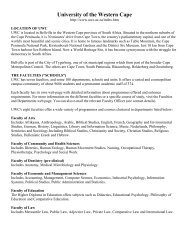UNIVERSITY OF BOTSWANA - Home
UNIVERSITY OF BOTSWANA - Home
UNIVERSITY OF BOTSWANA - Home
You also want an ePaper? Increase the reach of your titles
YUMPU automatically turns print PDFs into web optimized ePapers that Google loves.
At about the same time, Tswana chiefs were facing another external threat. The Boers, who had ousted<br />
Mzilikazi in the northern Transvaal and had occupied eastern Tswana lands, now informed the Tswana kings<br />
that their land and people were under Boer control. Some Tswana kings resisted, but the Boers attacked their<br />
villages - burning homes, destroying crops, and taking Batswana away as slaves to work on their farms. Then<br />
Tswana kings decided to ask Britain for protection, believing that this strong colonial power could save them<br />
from Boer domination.<br />
At first the British refused, but then in the 1880s, the British Government made an abrupt about-face. The<br />
'missionary road', which ran north from South Africa through Botswana, became increasingly important. Gold<br />
had been discovered in 1866 at Tati, and in 1867 in present-day Zimbabwe. Cecil Rhodes and the missionaries,<br />
who were trying to protect the Batswana from Boer encroachment, persuaded the British Government to change<br />
its mind, and on 30 September 1885 Botswana was declared the British Protectorate of Bechuanaland.<br />
This surprised the Tswana kings, who openly queried this sudden shift in position. Whilst they agreed to their<br />
land becoming a protectorate, they also made it clear that they did not want the British to interfere with their<br />
laws and government, nor did they want any of their land to be sold. There seemed to be no clear understanding<br />
as to what this actually meant. Eventually, the protectorate status was accepted by all the Tswana kings.<br />
Botswana had been saved from Boer domination, and even inclusion into the South African Republic. But<br />
shortly thereafter, another threat was imminent. During the late 1880s early 1890s in another land scramble,<br />
concessionaires started arriving in their droves, seeking land to set up businesses. They were supported by the<br />
British Government, which wished to use them to colonize as cheaply as possible. Amongst these<br />
concessionaires was Cecil John Rhodes, the wealthy mining magnate and South African politician. He wanted<br />
to colonize Mashonaland and exploit its wealth of natural resources (hence the colony's name - Rhodesia). He<br />
also wanted to take over Bechuanaland, and incorporate it into his northern colony.<br />
Understanding Rhodes' enormous power and influence, three Tswana kings - Khama, Bathoen and Sebele -<br />
went to England in 1895 to persuade the British Government not to transfer the Protectorate. At first<br />
unsuccessful, the kings then took their case to the British public. While this contributed to the British<br />
Government's reversal of its decision, the major factor was the Jameson Raid in 1896 - a failed invasion of the<br />
Transvaal by one of Rhodes' administrators for which Rhodes was blamed and his British South Africa<br />
Company was forced out of the Protectorate.<br />
Bechuanaland faced other threats, particularly after the Union of South Africa was formed in 1910 and the<br />
intention was made known to incorporate Bechuanaland, Swaziland, Basutoland (today's Lesotho), and<br />
Rhodesia. This was met with the continual vigorous resistance of the Tswana kings - expressed both inside and<br />
outside Bechuanaland, and it was this that saved Bechuanaland from inclusion into either Rhodesia or South<br />
Africa.<br />
Botswana remained a protectorate for the next 80 years, during which time a number of autonomous but related<br />
Tswana states were forged into one country. Almost nothing was done in the realms of health, education,<br />
economics and communications. However, the majority of Batswana were spared having to undergo the<br />
mistreatment, pain and humiliation of the regimes both north and south of their territory.<br />
Independence<br />
Growing dissatisfaction with British protection and an increasing nationalism among Batswana found<br />
expression though tribal leaders, who exercised considerable power at a local level. From the 1930s, demands<br />
for self-determination were increasingly vocalised through the African Advisory Council, which often found<br />
itself in conflict with the colonial administration.<br />
7



